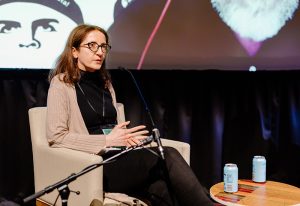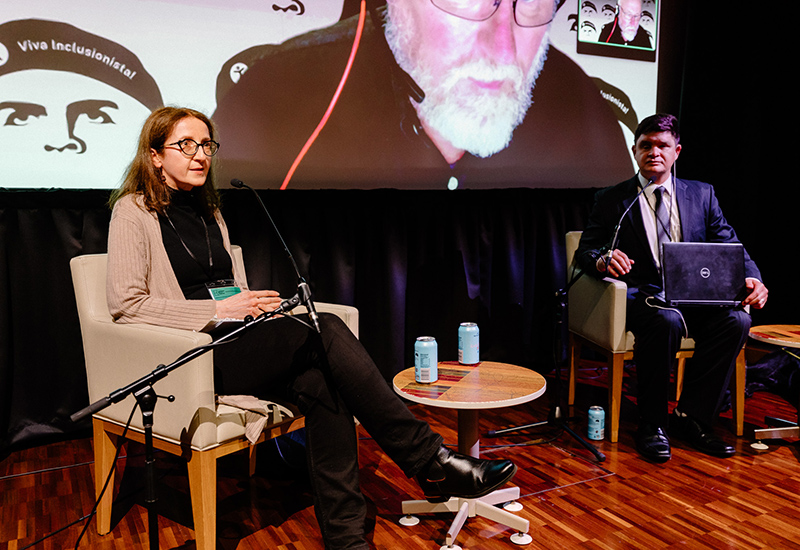Brisbane Writers Festival – Accessibility Matters
Panel: Dr Agata Mrva-Montoya, Greg Alchin, Laura Brady, Paul Harpur (chair). Laura and Greg joined the panel by Zoom.
Paul introduced the panel members. Using his own experience, he discussed the impact of loss of eyesight. Access to print material is not a choice; lack or limitation of access is profoundly challenging for vision-impaired people.
Greg followed on with the same theme. Again, and referencing his own experience, he explored the particular impact of delay in, or denial of, access to print material. He talked of the enabling of developments in e-publishing.
Laura spoke of her involvement in aspects of writing, editing and publishing and, in particular, working to improve the supply of accessible print material and broadening the base of accessible resources. She relies on working with a network of people with lived experience.
As a researcher and consultant, Agata noted that there’s a huge market for audiobooks (for pleasure, learning) and accessible braille for those whom braille is best suited (academics, researchers and others).
Paul commented that, in his early academic life, the university library had few accessible books; however, demand for books in a format that visually impaired people can access has led to valuable developments. Ebooks published as EPUB3 are arguably the most reliable format that visually impaired people can use, as screen readers enable text and audio conversion. There is, however, the problem in that ebooks are released after the hardcopy versions.
As a visually-impaired legal academic, Paul experienced the attitude that: “If you can fit in, OK, and if you cannot, too bad”. This highlighted for him the right to access. A turning point was the fair dealing exceptions granted under Sections 113E and 113F of the Copyright Act, which were amended following the ratification of the Marrakesh Treaty. These fair dealing provisions seek to ensure equitable access to information by persons with a disability, clarifying that this use does not infringe copyright. This was a huge shift in helping with the distribution of books in accessible formats.

Header photo and this photo by Markus Ravik
Agata added that this article had galvanised the publishing industry. Guidelines are being developed, and IPEd has established a working party to advance understanding and practice in this changed environment. She noted that as recently as 2020, a survey of publishers had revealed a lack of awareness of accessibility requirements: they continue to release books that are not prepared in an accessible format.
Greg introduced the concept of procurement, noting the size of the (potential) market. In NSW, 25% of the population is over 65, and physical capacities, including eyesight, decrease with age. There’s a growing market.
He referred to EN 301 549, the European standard for digital accessibility, relating to accessibility requirements in procurement, starting with specifications. This includes ebooks; it relates especially to libraries and businesses.
EN 301 549 was so well regarded that it was adopted without change as the Australian Standard on Accessible Procurement. It’s an exact copy. He observed that consumers and their dollars drive such standards.
Laura commented that not all ebooks are equal, and interested parties need to “rattle the chain” with publishers in this respect, to show them what we want. As well, we should support publishers who understand what accessibility means. Suggested activities include working on accessibility at the library level; workshopping accessibility with editors and publishers’ staff; and encouraging librarians to develop expertise in accessibility. She pointed to subject matter courses in Canada and Europe.
The 2019 European standard galvanised many publishers. Laura sets a goal for all ebooks to be in an accessible format by 2023.
Paul addressed what publishers can do, referring to some examples of strategic litigation and intention of litigation which helped get attention, and he set out what is possible in both content access and format access.
He advised that publishers should tackle accessibility style guides as early as possible in the process: at the entry stage.
There’s a great need to tell people about accessibility – what it means, which publishers – and to use all available channels for communication.
Laura pointed out that the matter shouldn’t be allowed to be “siloed”. We should encourage publishers to appoint an in-house accessibility advocate with across-the-organisation engagement. It’s critical to involve editorial staff, and have publishers apply the standard at the procurement stage.
As well as advocating adoption to publishers, we should also advocate to schools, local governments, and libraries, to do their buying to the procurement standard. Everyone can be an accessibility champion.
Greg recommended two works: Inclusive Publishing in Australia: An Introductory Guide by Julie Ganner and Greg Alchin and Making Content Accessible: A Guide to Navigating Australian Copyright Law for Disability Access. These free publications can be downloaded from the Australian Inclusive Publishing Initiative website.
Paul reminds publishers of the increase in their market reach as many people have a print disability. He recommends that publishers include their commitment to accessibility in their marketing material, including their website.
Questions were invited and these were comments in response.
It’s recognised that formatting poetry for accessibility is part of the creative process. Canada has a program for educating production staff on keeping the poet’s intent.
Many people prefer to download and read in braille for certain activities and in Canada it’s an expected resource. Others prefer novels in audio. It’s important to encourage authors to ensure, in their contracts, that their work is published in a braille version as well as hardcopy, and to have conversion into all formats. Braille format is very important for spelling and grammar. Some publishers are now working with disability organisations.
Canadian achievements in having publishers including braille versions were supported significantly by grant funding. It’s an achievement to have books in braille on bookshelves alongside ordinary books.
The NSW Government has a unit devoted to production of braille-version books for schools.
Great opportunities exist to take advantage of developments in technologies to increase accessibility. Getting publishers involved early is a valuable step.
Panel chair Paul thanked Agata, Laura and Greg for their contributions and positivity; sentiments reflected in the audience response.
By Ian Mathieson

